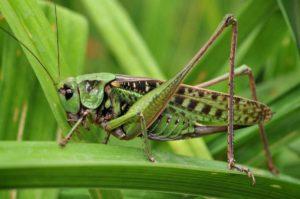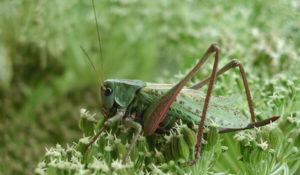Grasshoppers in the garden: 5 ways to get rid of them
In the warm season in the gardens and garden beds, life is in full swing. In the air, on the ground and even underground, you can find a huge number of different insects, and the problem is that almost half of them are pests. Among these same pests, inexperienced gardeners often attribute those who in fact may turn out to be harmless, for example, grasshoppers.
Content
Is it worth it to fight grasshoppers
The grasshopper family has a huge variety of species and most of them are predators. The diet of these insects usually includes other insects, such as:
- caterpillars;
- aphid;
- butterflies;
- small locust;
- Colorado beetles.

Common grasshopper.
Sometimes, with a lack of protein food, grasshoppers can even resort to cannibalism. Cruel as it may sound, these cute insects are happy to feast on their weaker counterparts if necessary.
Predatory species of grasshoppers switch to plant food only in the complete absence of other sources of food.
Grasshoppers are vegetarians
In addition to predatory grasshoppers, there are also herbivores. In terms of species diversity and number of individuals, they are significantly inferior to their counterparts. In gardens and gardens, they are much less common, and only a few individual species are considered real pests.
However, if we compare the benefits that predatory grasshoppers bring, and the harm that herbivores cause, then we can safely say that grasshoppers are more often beneficial insects than pests.
How to get rid of grasshoppers
If herbivorous grasshoppers nevertheless appeared on the site and began to actively destroy the future crop, then it is definitely worth starting to fight these insects. The most vulnerable, they are at the stage of larvae or eggs.
Coping with adults is much more difficult, since they are able to quickly jump over long distances and while you are about to process the bed they have hit, they may be at the other end of the site.
Biological methods of struggle
The most effective and environmentally safe method is to attract natural enemies of these insects to the site.
Grasshoppers have quite a few different enemies in the wild, including other insects, birds, and even fungi.
microsporidia
Microsporidia are protozoan fungi that parasitize the bodies of grasshoppers. They penetrate into the body of an insect at the cellular level and lead to the occurrence of many diseases and even death of the animal.
It is worth noting that for birds that feed on infected insects, microsporidia do not pose any danger.
In specialized stores, you can find bran treated with microsporidia spores.
In order for the parasite to cope with its task, it is enough to sprinkle bran on the beds. As soon as the grasshopper comes into contact with them, the spores enter its body and begin to act.
The efficiency of this method is at a very high level. This is due to the fact that infected individuals can also infect their healthy counterparts. Due to this, even a few grasshoppers in contact with the fungus can infect 3 to 10 other insects.
Poultry
As you know, almost all birds love to eat insects and domestic species are no exception. Faithful allies in the fight against the invasion of grasshoppers can be:
- chickens;
- turkeys;
- guinea fowl.
This is the main minus such a method is a high risk that, along with grasshoppers, plants in the beds may also suffer due to birds, and an additional plus - This is a generous soil fertilizer with the waste products of birds.
Enemies of grasshoppers in the wild
In the natural environment, grasshoppers are included in the diet of many animals:
- predatory insects;
- rodents;
- frogs;
- wild birds.
To reduce the number of harmful insects, it is necessary to attract these animals to the site. This can be done by installing special feeders around the perimeter.
Use of chemicals
If the population of grasshoppers is large enough and it is impossible to cope with them using other methods, then you can resort to the help of insecticides. The range of specialized drugs on the market is quite wide. The most effective among them are:
- Karbofos;
- You decide;
- Nembakt;
- Anthony.
The main disadvantage of using insecticides is their effect on beneficial insects, such as honey bees.
Traditional recipes
For opponents of the use of chemicals, there are a huge number of folk recipes for pest control. The simplest and most effective among them are:
- spraying with infusion of garlic and laundry soap;
- treatment with a decoction of wormwood;
- sprinkling soil on the beds with a dry mixture of tobacco dust and ground red pepper.
Prevention of the appearance of grasshoppers on the site
In order not to have to deal with grasshoppers and other pests in the beds, it is enough to follow useful recommendations that will help prevent their invasion:
- remove weeds in a timely manner;
- place several birdhouses in the garden and regularly leave treats for feathered helpers in them;
- every autumn, clean the site from garbage heaps, old stumps and logs, as they are a favorite wintering place for pests;
- at least several times during the season, carry out preventive spraying of plants.
Conclusion
Grasshoppers most often do not cause any harm to plants in the beds, and before you start exterminating them, you should make sure that they are to blame. As practice shows, grasshoppers are very often blamed undeservedly and it is quite possible that getting rid of them will make the situation even worse.
Previous
